|
| This is a continuation of my last post, Into the Heart of Darkness, February 8, 2020, and the final serialization of “Before and After Vietnam.” It takes my adventures of 50 years ago up through May of 1970, at which time it finally ends.
ENTERING THAILAND
After escaping from Cambodia following the coup that overthrew Norodom Sihanouk, on March 16, 1970, I arrived in Bangkok via an ancient train from Aranya Pratet, across the border from Poipet, pulled by a wood-burning locomotive. There were a handful of westerners on the train, including a family with a blond mother who fascinated the local Thai children; they couldn’t keep their hands off her hair.
In Bangkok, I met up with Capt. John Evans, Corps of Engineers officer and an architect I had known from Vietnam. John worked at the 20th Engineer Brigade headquarters at Long Binh. I was finally able to withdraw some money from the bank to continue my travels. I stayed in a small hotel and spent a few days seeing all the sights, the wats (temples), the silk factories and the water markets.
I was in a marketplace one day taking a photo, and a kid grabbed my camera and ran down the narrow alley of the market. I gave chase for several hundred feet when a policeman appeared and grabbed him. The cop gave me my camera back and let the kid go. He told me I was lucky to be alive and advised me to get back to the tourist areas.
19 March 1970
Dear Folks,
I’m putting some things in the mail today at the APO in Bangkok.
- Two pieces of Thai silk, one for Mother and one for Nancy. These are supposed to be sufficient for making one dress.
- A Cambodian Buddhist monk’s orange robe with belt. Maybe Nancy can make something out of this.
- Temple rubbings from Ankhor Wat (large roll). You may select one of these for framing – then hold the rest until I return.
- Temple rubbings from Bangkok wats – (small roll). There are nine of these. Why don’t you give away about half of them to the Shirleys, Stairs – and anybody else that seems appropriate.
I’m leaving tomorrow for Hong Kong. Everything is fine. I will write later.
The return address on the packages and this letter is a friend, so that I can use the APO.
Love, Tom
HONG KONG
Arriving in Hong Kong on March 24, I looked up Bernhard Horstmann’s mother, Charlotte Horstmann, with whom I stayed for the next few days.
Bernhard was born in China to a mother who was the daughter of missionaries and a father who was a German banker. His mother’s father was Chinese. Just before the Communists took over in 1949, Bernhard’s parents divorced, and his mother, then single with four children, had to flee, ending up temporarily in Thailand. They spent several years in Thailand before returning to Germany. Eventually, Mrs. Horstmann made her way back to Hong Kong where she went into the antique business and made quite a name for herself.
Bernhard received his early schooling in Hong Kong. Later, he attended boarding school in Germany while his mother became a highly successful dealer in Chinese antiquities in Hong Kong. Her shop was a “don’t miss” destination for stars, politicians, business magnates and high-ranking government officials from around the world. Click here for a 1982 article in the New York Times.
While I was in Hong Kong, Herbert Marcus, Jr. and his wife visited Charlotte Horstmann for some antique shopping. Herbert was the son of Neiman-Marcus founder Herbert Marcus and brother of Neiman-Marcus CEO at the time, Stanley Marcus. Charlotte took us to dinner at the Peninsula Hotel, Hong Kong’s grand historic hotel. The next day, Herbert went to get some suits made at a tailor Charlotte recommended, Tailor Chan. I went along and ordered a Cashmere topcoat after Tailor Chan said he would sell it to me at fraction of what Marcus paid for his. Chan said he knew I didn’t have much money, so he would do it as a favor for Charlotte.
See Hong Kong 1970 for some old home movies I made in Hong Kong.
JAPAN
I caught up with Bernhard Horstmann in Tokyo, where he explained a couple of things. The money he was supposed to send me he left with one of his mother’s employees. They guy got confused and sent it through regular international mail instead of to my APO address. That’s how it ended up in the Saigon post office and caused me so many problems. The other thing was that he had come down with hepatitis that he blamed on the water from our Saigon apartment. It turned out that all that water “mama-san” was supposed to be boiling and putting in our refrigerator was right out of the Saigon water system. I felt lucky to have dodged that bullet.
The following letter pretty well covers what I did in Japan.
8 April, 1970, Tokyo
Dear Folks,
I’m in Tokyo now and getting ready to leave for Vienna tomorrow via Russia. I’ve checked this thing out real well and have been assured by everyone that there will be no problems. The Russian trip is very popular with many people who have retired from the service in Japan and are taking the long route home at that time.
It’s been a while since I wrote last, so I’ll try to catch you up with what’s happening. I left Phnom Penh only the day before the coup d’etat – because I was in Siem Reap instead of Phnom Penh, I was unaware of the developing situation, which took me completely by surprise.[1] The first two days in Phnom Penh, however, I did watch the mob sack the North Vietnamese embassy. Something was obviously afoot, but I couldn’t imagine Sihounouk getting run out of the country. I thought it was only an indication of a change in policy. Anyway, the trip to Thailand was interesting. Instead of flying like all the other tourists, I took a car and then a wagon pulled by a Honda to the western border at Poipet. We had to walk the last ½ mile into Thailand across a kind of no-man’s land and then took a 3rd class train on to Bangkok.
Bangkok was too big and too westernized to be really interesting, and at the time I wanted to get on up to Tokyo before Bernhard left for the states. So I spent nearly a week anyway looking around, etc. I met a friend from, ‘Nam, John Evans, the last two days there who was on his way to Africa for a 30-day leave. In Bangkok, I lost my travel notes that had all those names I was supposed to look up in Japan, so that was all out the window. I know you will condemn me for that because of the trouble Murt and Haha went to to round them up – but what can I do?
So – Hong Kong was the first stop – where Bernhard’s mother was nice enough to put me up for a week. She is a fantastic person with energy seemingly endless. Besides her shop, she owns a furniture factory which turns out very expensive things for very rich people who seem to make up the bulk of her clientele. The shop of Charlotte Horstmann, Ltd., is a must stop for anybody that is somebody in Asia. I met ambassadors, princes, etc., while hanging around the place, and there was no end to my astonishment! Because I had no clothes, I planned to get some made while in Hong Kong. Mrs. Horstmann called up a tailor and shirtmaker to whom she referred me and asked them to give me a good price on whatever I ordered. The tailor is one of the best in Hong Kong and gave me about 1/3 of his normal prices. I know this for a fact because one of the Marcus brothers (Neiman-Marcus, Dallas) was having clothes made there also and paid $150.00 for topcoat which cost me only $120.00 for the identical item. I had two suits, two sport coats and a topcoat made. They were expensive by my standards, but really top quality and a fantastic bargain. I had to go in for fittings once or twice a day for almost a week. They’re the best fitting clothes I’ve ever had.
Two weeks ago, I flew on up to Tokyo and caught Bernhard just before he was leaving for the states. He had a place all set up for me to stay with the family of a girl he had been dating. I was a little leery of the whole thing – not even knowing these people, but everyone assured me there was no problem, no imposition, etc., so I moved on in. They have a huge house with beautiful garden, lots of servants, etc. right in the middle of Tokyo. One of their daughters and her husband are staying in Japan between college and graduate school, and the other daughter is in between changing colleges. They all speak fluent Japanese, and the three young people are working part-time teaching English to Japanese businessmen. A real good bunch – and lots of fun.
I stayed here for about 4 days while getting my Russian trip set up, and then went to Kyoto for a week. Kyoto is kind of like the “Philadelphia” of Japan and is full of old palaces, temples, gardens, etc. – basically everything that is typical of Japanese architecture and gardening. I spent two more days with another friend of Bernhard’s near Kyoto – and from there and Kyoto – I visited Expo 70 for parts of three different days. Very impressive – but you didn’t miss much by not being here – if you know what I mean. “If you’ve seen one world’s fair, you’ve seen them all.” The gardens and shrines of Kyoto were much more worthwhile as a justification for a trip to Japan.
Tomorrow, I board a ship at Yokohama that takes 2 days to go to Nahodka, then I take a train for one day to Khaborovsk and fly the rest of the way to Moscow. The alternate arrangement is a seven-day train trip for the same cost, which I didn’t think would be a very good idea. I have one day in Moscow and two full days in Leningrad before flying on to Austria. I wanted to take the train, but it would have involved an extra two weeks here getting transit visas for Poland & Czechoslovakia. The Buzzartes (the people I’m staying with) made this trip a couple a years ago and have been full of helpful hints and encouragement.
I should arrive in Vienna on 16 April – and you can write me there c/o Sharon Blair at UNIDO, PO Box 837, A-1011, Vienna, Austria. I am sending with this letter a copy of my discharge and discharge orders just in case I lose the original – because it is my free ticket back to the states.
Another thing I would appreciate for you to do is to put a phone call in to George Coppage or Charles Allen at 415/383-4180 and see if my hold baggage from Vietnam has arrived yet – and se if they will have or are having any problems storing it. The address I had it sent to was Cove Apartments, 10 Seadrift Landing, Tiburon, CA 94920, but since I’ve been gone I’ve had no communication with Coppage. I just want to affirm this, since I have over $2,000.00 worth of stereo equipment and other thing in it. I had it sent to California instead of home because there was so much stuff – and I was going on back to S.F anyway. Please advise – or have Coppage write me at Sharon’s address. I got your two letters here. They were waiting for me when I arrived. Another thing – let me now as soon as I get something one way or another about Berkeley. I’m not optimistic about getting in, but you never know. I should be hearing something between now and June.
Cherry blossoms are just coming out here – I hate to head north again, but it will be spring again in Vienna. I’ll write from Russia if I have time.

For home movies from Japan 1970, see Osaka and Japan 1970
 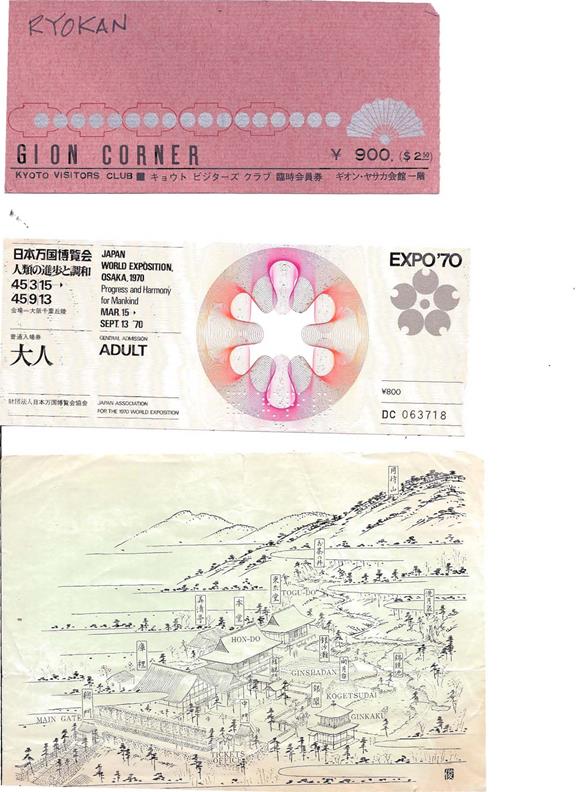
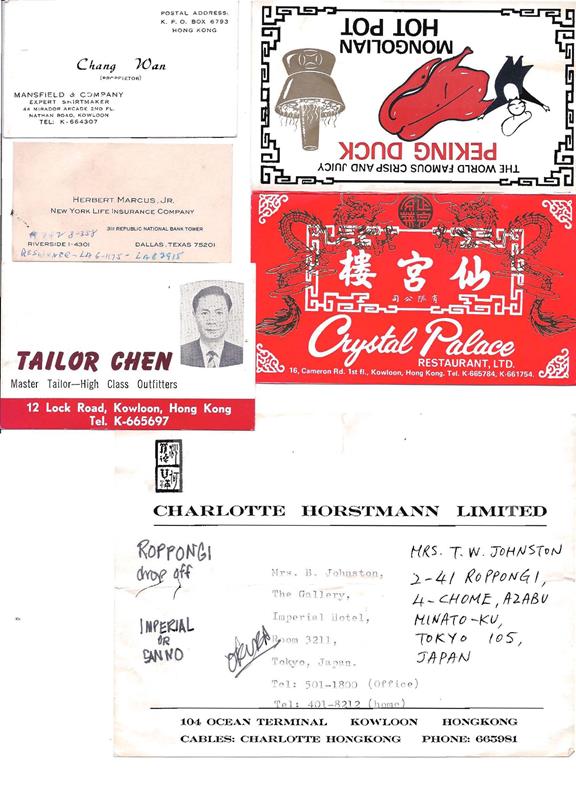
Figure 2 - Cards from Hong Kong
USSR
We left Yokohama on April 9 and arrived in Nakhodka April 11, 2970. Passengers were a combination of Japanese and a few westerners. The crew was Russian and put on a little Russian style entertainment for us on the way – singing and dancing. I made friends with a couple of Swiss guys and some Japanese girls. One in particular, Toshiko Yamamoto, I ran into again in Vienna. We didn’t waste much time getting on the train. Most of the people who had come on the boat were going to go by train all the way to Moscow, about a week’s journey.
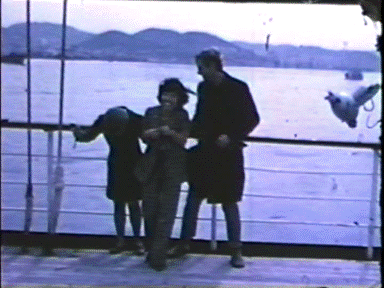
Figure 3 - With Toshiko Yamamoto in Nakhodka Harbor
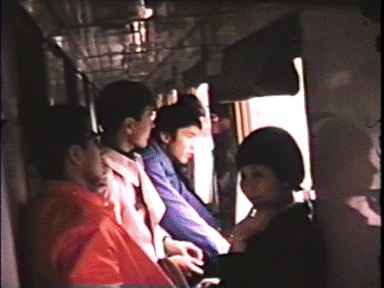


See Journey Across the USSR for a home movie of my time in the USSR.
In Khabarovsk, it was cold and snowy. I boarded a plane for Moscow. I think it must have been a Tupolev Tu-114, a very large prop jet, very old-fashioned looking, like something from the 1950s. I sat in one of two opposing seats with table in between with three high-ranking Russian military officers. They found it interesting that just a month before I was part of the U.S. Army in Vietnam in a war in which the USSR was not only sympathetic to but assisting the other side.
Moscow was also cold and snowy. I had only two days there. I think I stayed in the Hotel Metropol. I visited the Kremlin, Red Square and just walked around a lot. I remember there were stores that were off limits to everyone but tourists and communist officials, including a “supermarket” where all the labels were just black print on white – no graphics and no advertising. In fact, advertising of any kind seemed to be forbidden. The stores the ordinary people could go to were bare bones – literally. I went to meat market, and there was nothing left but bones. The protocol in all stores was to stand in line to pay first, then stand in line again to collect the merchandise. The only thing I bought were some phonograph records. On the night before I was schedule to take a train to Leningrad, I met a girl, partied late and missed my 7:30 AM train the next morning. I thought Intourist was going to arrest me. Apparently, deviating from a schedule was a big deal.
Leningrad had a distinctly different feeling than Moscow, more liberal. Some shops and cafes had graphic signage that looked like advertising. I visited the Winter Palace and the Hermitage Museum, both excellently cared for, only 25 years after Leningrad was virtually destroyed in WWII.
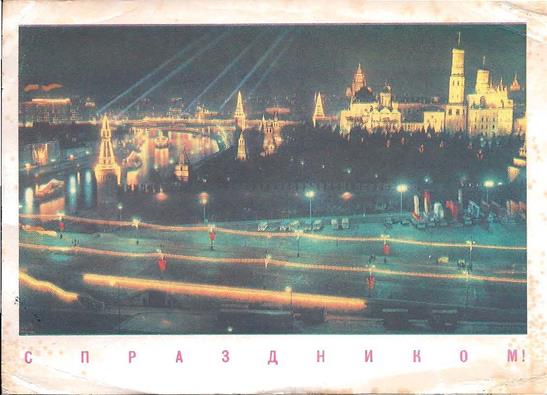
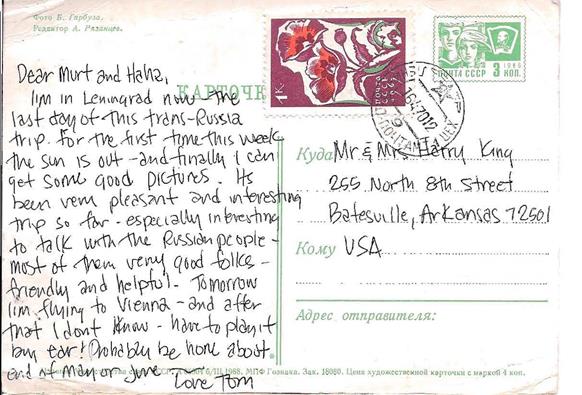
Figure 1 - Postcard to my grandparents from Leningrad
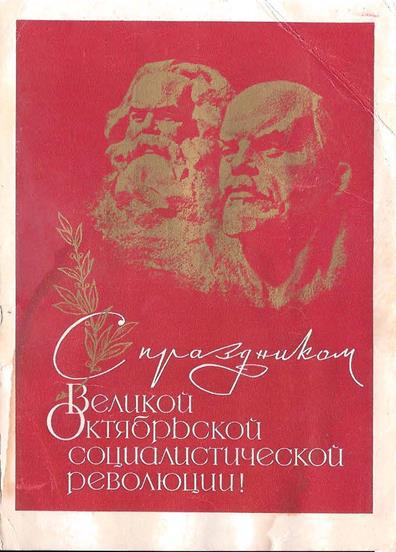
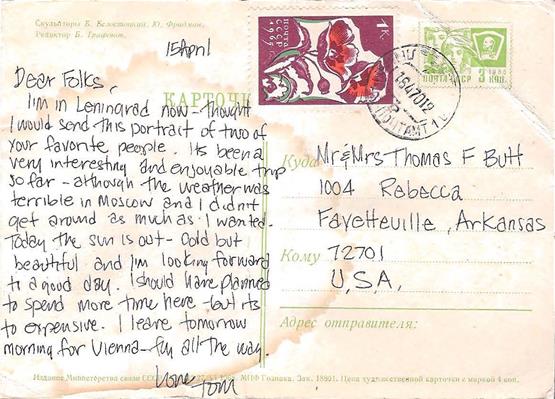
Figure 2 - Postcard to my parents from Leningrad
There was a nightclub in my hotel that was of limits to all but tourists and communist party officials. The night I was there, I had dinner with some well-dressed “Young Communists,” children of communist officials.
On more than one occasion, I was propositioned to sell my blue jeans for attractive sums. But I resisted.
I think the whole trip through the USSR, April 11-16, 1970, arranged by Intourist, including transportation and lodging only cost about $260.
On the final day, I took a train back to Moscow and took a plane to Vienna.
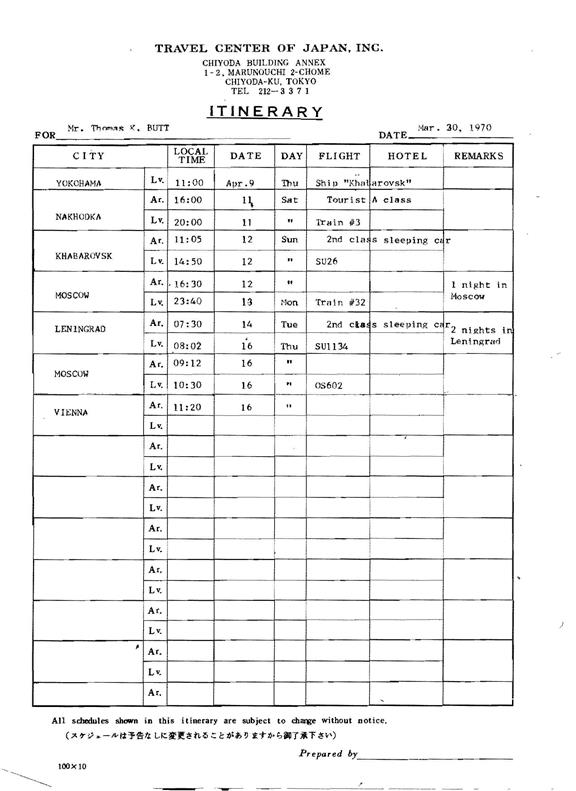
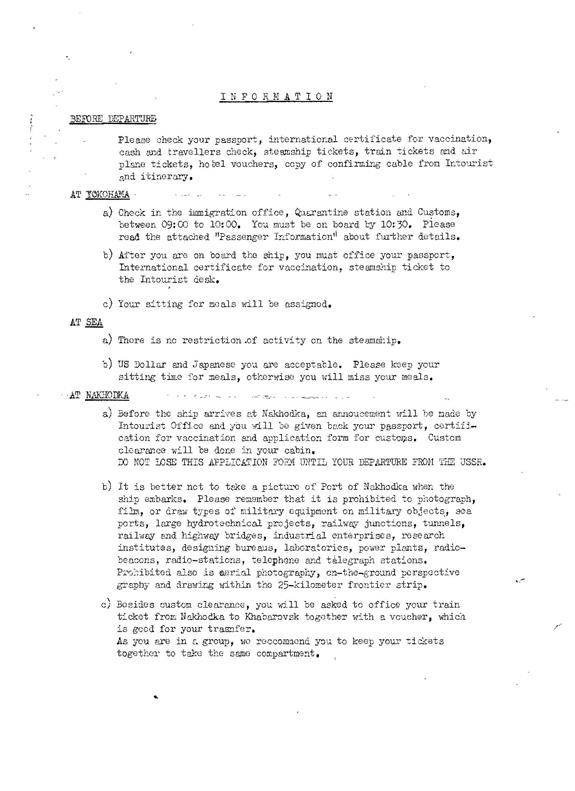
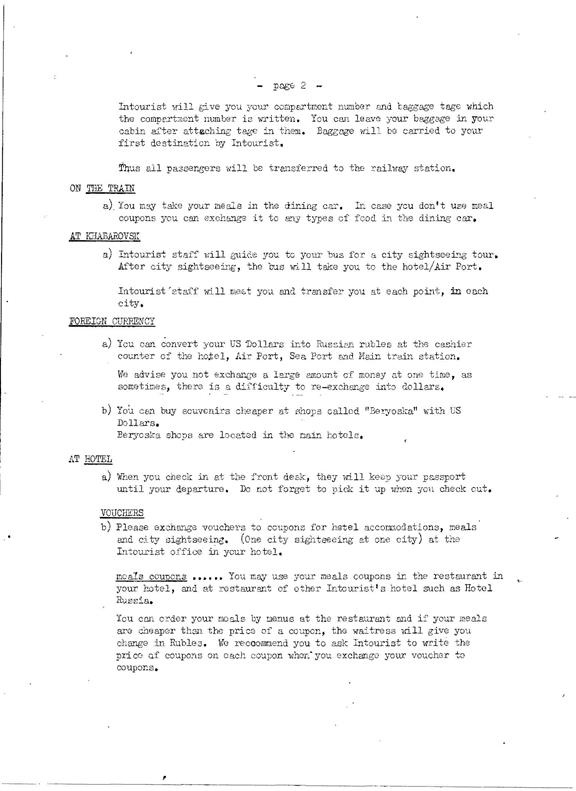
Figure 5 - Itinerary of USSR Trip
15 April 1970, Leningrad
Dear Folks,
I’m in Leningrad now. Thought I would send this portrait of two of your favorite people. It’s been a very interesting and enjoyable trip so far, although the weather was terrible in Moscow, and I didn’t get around as much as I wanted. Today, the sun is out – cold but beautiful, and I’m looking forward to a good day. I should have planned to spend more time here, but it’s too expensive. I leave tomorrow morning for Vienna – fly all the way.
Love, Tom
AUSTRIA
I arrived in Vienna on April 16, 1970. The letter below is more about the USSR than about Vienna. I stayed with Pat Rowan and Sharon Blair, whom I knew from the University of Arkansas, for the duration. I had dated Sharon in college, and I visited her frequently in Dallas where she and Pat were roommates when I was at Ft. Polk. I also ran into the Japanese girl, Toshiko Yamamoto, with whom I shared the boat trip from Yokohama to Nahodka and the two days on the Trans-Siberian Railway. I ended up spending a day in Vienna with Toshiko.
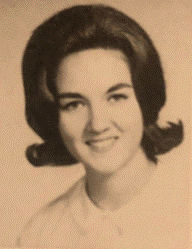 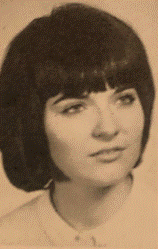

22 April 1970, Vienna
Dear Folks,
In Vienna now – for some five days. Spring arrived the day I did, but the weather is suffering a relapse these last two days,
Sharon met me at the airport, and I’ve been staying with her and Pat, and getting shown around royally. Vienna is one of the most beautiful cities I’ve ever visited – but awfully quiet (literally and figuratively). Apparently, lack of excitement has gotten to Pat – She’s leaving for Paris sometime next month. As for me, I’ve got the same problem I had before – two fantastic girls whom I would like to date separately – straighten my mind out – but what can I do is this situation? Very Strange!
I don’t have a single plan for more than 24 hours in advance right now. I may stay here for a while – or go to Spain – or Paris – or the U.S. Just don’t know. I wish I knew something about the Berkeley application. I’ve been thinking of trying to get into some graduate school over here, or working for a while – in that case – it would have to be either in England or France because of the language problem. I’m going to write Gordon Watson to see if he’s still in London – and also Mart Vehik – who is still at Oxford, I think – to see what the educational and employment situation is there now.
My trip to Russia ended much too quickly. There are so many strange things going on that I wanted to know more about – but no time!
I’ll try to give you some impressions of the trip while they are still fresh on my mind, in more or less chronological sequence. We left Yokohama on a passenger ship with about 10-odd people – mostly Japanese with a few Australians and Europeans thrown in – and maybe 2 or 3 other Americans. The crew was all Russian – and a very friendly and talented bunch (I think musical talent was a prerequisite for employment). It was a two-day trip to Nakhodkha – during which time I met a good many of the Japanese folks – and became good friends with several (mostly female type). Nakhodkha is quite near Vladivostok but is used as a tourist port of entry because the navy is at Vladivostok – a much larger city.
The bleakness of Siberia is absolutely appalling! Not so much the land – but the city – which typically sprawls over a tremendous area with no apparent center or cohesiveness – kind of like an infinite college campus. There are few cars – lots of streets – and the next most immediately striking thing is the complete lack of commercial retail outlets, as we know them. Almost every residential building has a store of some sort on the lower floor – but you wouldn’t know it until you walk in and look around for it. Within the system, however, the people seem to be in not so bad shape – the basic essentials of life are available, and the Russians appear to be well dressed (perhaps better than people in many parts of the U.S.), and there are no starvation cases readily noticeable. Luxuries, as we know them, are just not available (which I will elaborate on later). From Nakhodkha all the way through the trip, there was absolutely no restraint applied to any of us as to where we could wander, whom we could talk to, or what we could photograph – although written instructions were distributed that forbade photos of airports or bridges.
We then took an overnight train trip north to Khaborovsk – and boarded a plane for a nine-hour trip to Moscow. The train was almost in the luxurious category – but it was especially laid on for the boatload of people coming in – it’s hard to judge how it would compare to what is available normally. The plane was a mixture of Russians and the same group from the boat – a large turbo-prop with considerably more room than an American plane would have. Everyone seemed to get along famously with the Russians on the plane – including a number of armed forces personnel.
Moscow was rainy and cold like nothing I’ve ever seen before – and after one soaking walking tour through the Kremlin, I gave up touristing as much as possible. The outskirts of Moscow have much the same appearance as the towns in Siberia – but with a little more finesse – and the newer apartment complexes have a standard of design that would show up many similar projects in the U.S., but that isn’t saying a whole lot. Downtown Moscow has preserved enough of the historical heritage, which leaned so heavily on French and European ideals for a couple of hundred years – principally in the reigns of Catherine and Peter. The Kremlin is huge and impressive in the center of town, and two thousand people stand in the most miserable weather to look at Lenin’s waxen face. I wouldn’t have stood ten minutes in that stuff to see anyone or anything! In Moscow, there are plenty of cars (though not anything like in the west), and they are all the same brand. There are more shops – more variety – and some of the newer complexes are just like shopping centers anywhere – though a little sparse – like they are anticipating a big shipment of merchandise to arrive any minute.
The hotels are all big in the grand style but a little Spartan, and the food is terrible and expensive. Better to eat outside where the Russians do – but there is always a line, and service is not up to the standards one would expect elsewhere. Here again, the people are well dressed and seem to be provided with everything they really need, but no luxuries. Moscow has a subway that looks like a palace and is spotlessly clean, fast and efficient, probably the best in the world – and other items of public transportation seem to be well planned and executed. I stayed an extra night in Moscow under the rationalization that the weather would clear, but it was actually due to a Japanese girl that I had taken a fancy to – and a group of jolly Russians who insisted we join them for vodka – which they chugged just like water – or maybe faster. Intourist takes it as a personal affront if you change your itinerary in the slightest, but I managed to get things worked out somehow.
Leningrad was a little chilly, but clear and spring-timey – and is probably the most liberal, European and prettiest city in Russia. Here again, the stores were a little better recognized than anywhere I had been previously – and there were actually window displays, neon lights, etc. – and even in profusion on a recognizable city center and main drag. Leningrad is full of history art and architecture – and is a very pleasant place. New – and the food was good. I was the only American I think in Leningrad at the time, and one of the few foreign tourists, who usually come in great profusion later in the year.
A few interesting points – the older Russians are generally suspicious and cold to visitors unless they are thrown together is a situation like the airplane – hotel, etc. But the younger ones are friendly and outgoing, and if they are in or graduated from college, have a varying knowledge of English. There is a black market on western goods and western money – about 3-4 times the legal exchange rate for dollars – and any luxury item (radios, records, American cigarettes, chewing gum, etc.) brings a premium in rubles. I didn’t indulge – but I was approached constantly by students and younger Russians. Most of the things they wanted were things we take for granted – but for one reason or another are not available. Caviar, for instance, is not available in the Russian stores – but can be bought by foreigners with foreign currency in special stores – usually located in hotels.
All in all, it’s really difficult for me to draw up an opinion without studying the facts more, but unquestionably, the Russian people have been forced to give up the normality of life as most people in the world know it in order to pursue an industrial might and military power that are no joke. Whether they would be where they are today, as a primary world power if the Revolution of 1917 and subsequent communist dictatorship set up afterwards had not taken place is a question no one can answer – nor can one answer as to whether it was all worth it. But at any rate, the Russian people seem to be – for all their problems – a very proud bunch, cognizant of their history, patriotic and dedicated to the heroes of the Revolution (witness the crowds in Red Square to view Lenin). They all are ready to admit – and some did to me – that there have been problems and mistakes made in the past, but I think look to the future with kind of a resigned confidence. The excessively luxurious living standards of the Russian aristocracy have been arduously preserved everywhere, which is a great boon to art, but I suspect there is a more subtle reason – because they all figure in a quite realistic and encompassing “propaganda” campaign to glorify the accomplishments of the Revolution. Everywhere that tourists are apt to congregate in Russia, a tremendous amount of literature is available on every subject giving views of Lenin or contemporary communist thought. Being able to read only the French or English translations, it was difficult to say what the Russians are actually given to ingest for journalism of current events and history, but everything I could read never just said “United States” or “American.” It was always [refaced by “imperialistic” or “warmongering” or something. But other than that, the substance was surprisingly candid, biased of course, but not so much as much of what one reads in the U.S.
From what conversation I was able to have with them on the subject, a number of Russians had remarkably similar views to my own on the state of world affairs – vis a vis the war in southeast Asia (you can no longer confine it to Vietnam) and the war in the Middle East. They were personally unhappy that the leaders of their country had involved them to the extent they were – and had absolutely no wish to confront with the Americans or anyone else in these places, but they were not, of course, protesting, on much the same grounds that most Americans blindly follow our foreign policy under the dubious and ephemeral justification called “patriotism.” I am firmly convinced that although the Russians want to be perhaps the most powerful country on earth – and want to protect their national interests to the extent that anyone does – that they are not interested in “burying” America – or anyone else. The only danger lies in the seemingly inevitable parade of tyrants which history knows so well – that, like Hitler, were able to capture the imagination of and achieve mastery of the people and their destiny. And I’m not so sure that the American people are any better able to resist the advances of such men and their policies – even though we have theoretically set up the machinery of government to prevent it.
Which bring up the new “Indochina” war …, which we are now involved in and makes me absolutely sick. The recent events in Asia have created a situation which almost no one has any control over – and could go on interminably. I think the U.S. would be extremely well advised to stay out of Cambodia, to dissolve the army of mercenaries in Laos and to continue the “Vietnamization” of Vietnam as expeditiously as possible. No one in Laos has any interest in defending himself from the North Vietnamese, and they should therefore have the place if they want it. The Cambodians will defend themselves if they have the means to fight, which we should supply without the benefit of “advisors.” The South Vietnamese have developed an interest in defending themselves only because it’s now easier to be on “our” side than “their” side due to efforts in that country which have been amazingly successful lately – but everything considered – hardly worth the cost. I think this whole thing will end within a year if we will allow the North Viets to have Laos, part of Cambodia and maybe a little of South Vietnam. The fighting will stop for a while – if there are concessions made – and then the situation may stabilize if the governments of the free countries are smart enough to appear to their citizens to be a better alternative than any other possibility – which is doubtful considering the nature of the southeast Asian in a position of leadership (.e., corrupt). If the United States, however, continues to fight the half-clandestine, half-open war and trying to teach the will to resist as well as the means of resisting to a bunch of people who don’t give a damn, it’s going to be a long ball game.
The way it looks now – Nixon and Fulbright might turn out to be strange bedfellow type co-heroes of the Vietnam era. Fulbright, because he turned out to be right all the time that it wasn’t worth it, and Nixon because he got us out of it. The co-anti-heroes, or maybe villains, turn out to be Johnson, his advisors and generals – who all seemed to be ill informed and incapable of rational planning and execution of their adventure. In the incidents involving My Lai and other such “massacres, atrocities, etc.’” I fully support anybody below the rank of general – and fully condemn anybody on up – nothing personal, you understand, Dad, I deference to your rank!
As near as I can determine – not having been directly involved – the publicity about an obsession with body counts is quite true – and the encouragement from higher up to compete on this is also. We had the same thing in the engineers as applied to almost any statistic – the pressure to accomplish anything which would make the line on the briefing chart rise was fantastic – while the concern for quality and actual fulfillment of any long term goals was brought up only occasionally and soon forgotten. While the U.S. forces should have been “Vietnamizing” years ago, they were too busy counting bodies and competing for rank and publicity – training doesn’t make as good headlines as combat. Even in the engineers, we wouldn’t even associate with the Vietnamese when I came to “Nam, but when I left, we had whole units integrated within ours, and there was tremendous pressure to train them and do so successfully, which I think was the most important single policy implementation of the whole conflict. Amazing that it took some 6 years to think of it!
But enough of world politics – I wish I could tell you what my plans are, but I really don’t know. I’m torn among being completely degenerate for an indeterminate amount of time, being only partially degenerate (which means working at some nondescript job), going to school somewhere, traveling some more, coming back to the states, writing a book, doing independent research, doing nothing at all and playing it by ear, etc., etc., etc.
Also, I have to decide what to do about these two women – run away from the situation? Pick one and see what happens? Play it cool and see what happens, etc., etc.
Also, for finances, I don’t have any idea how much money I have in the bank, but I’m not anywhere near to running out, nor am I spending much.
I should be paid up on my American express bills, so don’t pay any if they come in. But I would appreciate it if you would write a check for any Diner’s Club statements which come in – but the total shouldn’t run over $300 or $400, all from Bangkok or Hong Kong. If you pay more than one statement, check to make sure there isn’t a duplication due to a repeat of the charges from the previous statement. I have not paid any Diner’s club charges to date. Also, if you get anything in the mail from American Express, disregard it unless it has a card in it, then in that case, forward it here. You already have the address, I think.
Other than that, not much happening.
Love, Tom
On April 24, Sharon Blair wrote this letter to my parents:
Dear Folks,
I enjoyed your letter so much and perhaps Tom has written to you since he arrived in Vienna on the 16th.
His travel tales are really something even though I have had hardly any time to spend with him. During April and for the first two weeks of May, my working day begins at 8:30 AM and usually ends sometime around 10:00 PM. But as fate would have it, I have worked past midnight at least two nights. Since Tom arrived. And unfortunately, the end of this particular madness comes around the middle of May.
Yesterday he ran into a fellow he met somewhere before Russia. I talked to Tom a couple of times on the phone, but then I think they disappeared. At least he didn’t show up at the apartment before I left this morning at 8:15. The last time I talked to him, he was in the UNIDO bar with a friend of mine from San Francisco, and Vicki hasn’t shown up for work this morning! So.
The last 48 hours have changed the direction of my life again. I have been asked toto be here in September to work this job again and since I have the summer free, I am returning to Fayetteville, Arkansas, for both sessions of summer school – in an attempt to get my degree. I hope there are no problems – naturally I haven’t heard from them yet. I also inquired about the possibility of working as a counselor in one of the dorms in order to solve the housing problem. Do you know of anyone who has a room near campus that I could rent for 12 weeks? It has to be cheap. And since I won’t have a car , I’m leaving my car here) will have it if I return or sell it if I don’t), the proximity to campus would be a big factor in getting a place to live.
I will probably need to work so I’m writing the paper and radio station. I herad, perhaps just a rumor, that there’s a television station n Fayetteville now. Is that true?
Must get to work. I’ll keep you posted on Tom’s whereabouts.
Love, Sharon
GREECE
In early May, 1970, I was getting antsy to move on, so I left Vienna via train with Pat Rowan. For videos see Vienna to Greece for home movies taken during the trip.
The train going south out of Vienna was extremely crowded with workers from points south going home for a holiday.
The former country of Yugoslavia is between Austria and Greece, and we must have passed through what are now Slovenia, Croatia, Bosnia and Herzegovenia, Serbia and Macedonia. I think we had to change trains in Zagreb and had to sleep in a railway station most of the night.
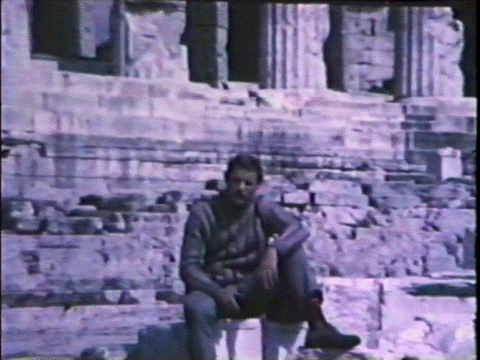
Figure 7 - Tom Butt at the Parthenon
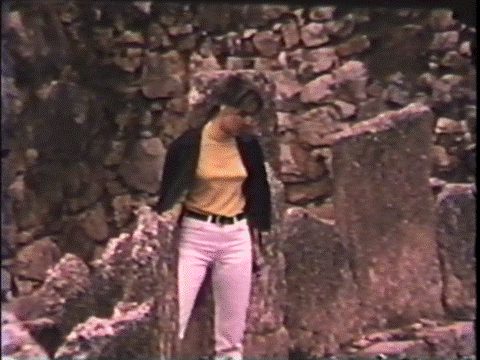
Figure 8 - Pat Rowan at Mycenae
After spending a couple of days in Athens, we went inland to several archaeological sites, including Mycenae, Epitauras and Corinth, then we took a ferry to visit several islands.
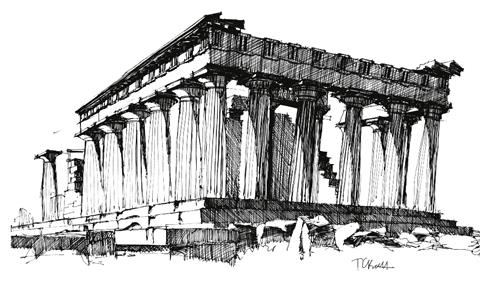
Figure 9 - The Temple of Aphaia or Afea is located within a sanctuary complex dedicated to the goddess Aphaia on the Greek island of Aigina, which lies in the Saronic Gulf. Formerly known as the Temple of Jupiter Panhellenius, the great Doric temple is now recognized as dedicated to the mother-goddess Aphaia.
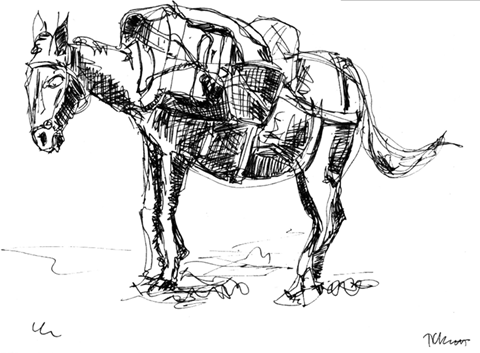
Figure 10 – We met this donkey packing supplies up to the monastery of Panagia Zourva is one of the most remote of the Greek Orthodox monasteries on Hydra Island Greece. It is reached over land or via 645 steps up from Zourva Bay if you go to the end of the island by boat.
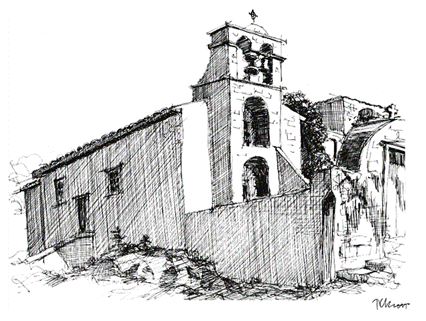
Figure 11 – Chapel on the trail to monastery of Panagia Zourva
A postcard to my grandparents:
12 May 1970, Hydra
Dear Murt & Haha,
I‘ve been on this little Greek island called Hydra for the last two days – never seen such a charming lace. No motor vehicles – only boats and donkeys. Greece is the best European country I’ve visited with the exception of maybe Spain. The food, the people are great and everything is amazingly cheap. I was in Athens for a week and toured around also to Mycenae, Edidauras and Corinth – places full of history and ruins from Greek, Roman and Byzantine periods. In a few days, I’m going to Venice, then back to Vienna to gather my luggage and probably to Germany to try and get my free ride home.
Love, Tom
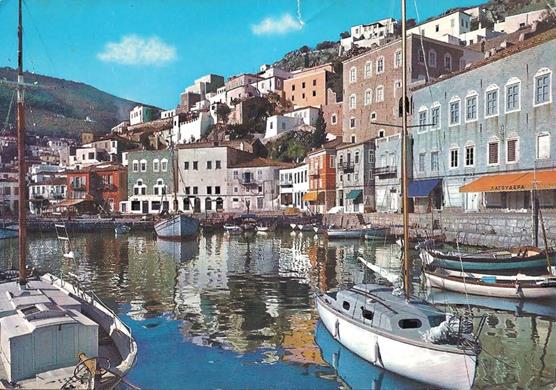
Figure 3 - Postcard from Hydra
 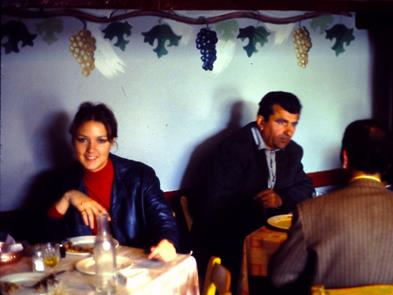

From Athens, Pat and I took a ferry to Venice, and she headed back to Vienna. Sharon Blair and I had planned to meet at Harry’s Bar in Venice for a few more days of touring, but something came up, and she didn’t make it.
Running out of money, I took the train northward to Frankfurt, where I was sure the U.S. Army would fly me back to the U.S. for free. Unfortunately, the folks at Rhein-Main Air Base looked at me like I was crazy. Fortunately, I had a credit card, and I booked a commercial flight back to the States, and ultimately to my home of record where my parents lived, Fayetteville, AR.
 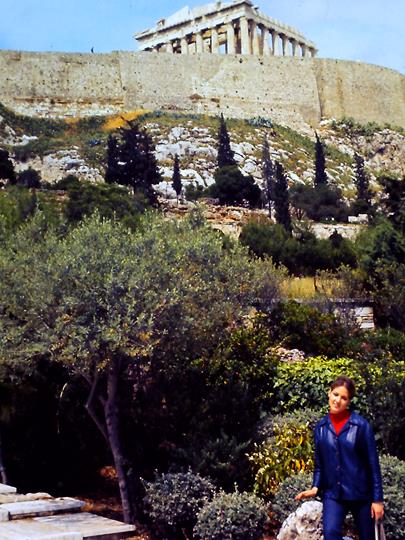
The End
And so ends an odyssey that started with ROTC in 1962 an ended after two years in the U.S. Army, including a year in Vietnam, followed by a trip around the world. After a few days in Arkansas, I headed to San Francisco to resume my previous (1968) employment with the architecture from of Edward Durrell Stone in Palo Alto.
|

